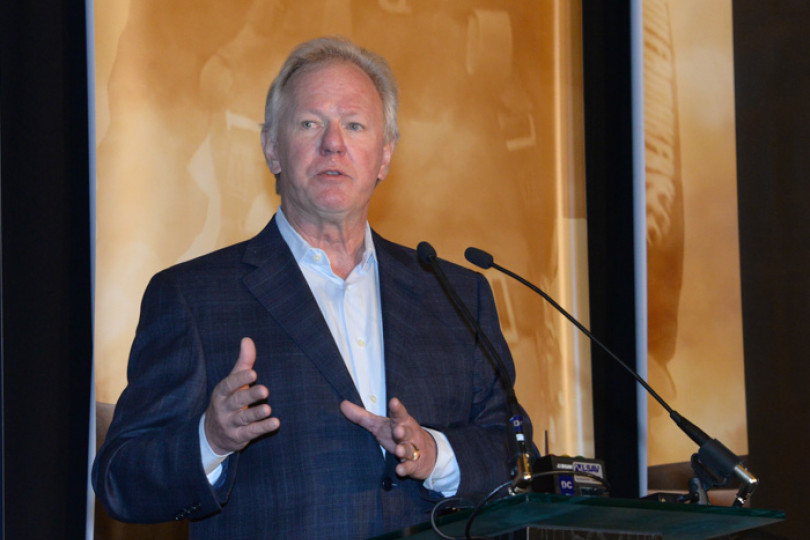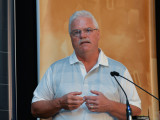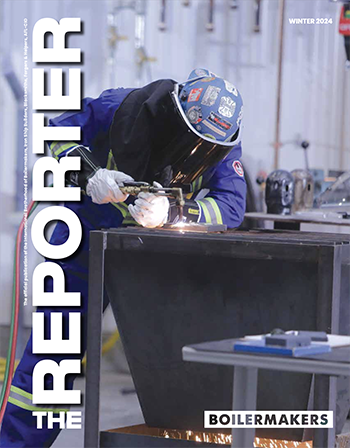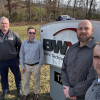We are going to put this funding to work for our members to generate more work opportunities and build back market share. This is an investment in Boilermakers’ futures and the future of our organization.
IP Jones unveils major initiative, delegates debate referral rule changes
PUT MORE WORK in the hands of Boilermakers. If discussions and presentations during the 2018 CSO Conference could be boiled down to one thing, that was it: More Boilermakers getting more of the work.
Indeed, ensuring a solid future for all Boilermaker members anchored many conference topics, as construction lodge leaders from across North America met in Fort Lauderdale, Florida, March 4-8 to discuss innovation, safety, challenges, growth, training and more.
“I want to thank you for the hard work you do every day,” said International President Newton B. Jones. “We’ve been through a decade of change, and it’s time to re-think what we’re doing as we go forward. It’s going to take some effort and some innovation and cooperation. We will move forward. We’re together. We’re one, and we have to think that way.”
Two future-focused discussions revolved around a new investment fund proposal, tentatively called the M.O.R.E Work Investment Fund, and new language updating referral processes.
M.O.R.E. Work Investment Fund
INTERNATIONAL PRESIDENT JONES introduced the International Executive Council’s M.O.R.E. Work Investment Fund Action Plan, which proposes to revitalize a variety of Boilermaker initiatives to grow the organization and provide greater work opportunities for construction sector members. The M.O.R.E. Work Investment Fund will be based upon hourly contributions and benefit the members in the IVP Area from which the funds originate. IVP Area Action Councils will be made up of the IVP Area CSO Business Managers with the IVP chairing the council, along with supporting staff.
The M.O.R.E. Work Investment Fund Action Plan initiative will undertake nationwide coordinated Marketing, Organizing, Recruitment and Employment activities aimed at increasing man-hours and market share that will not only provide greater work opportunities for members but will help ensure the National Pension Plan is properly funded. With the phase-out of many coal-powered generation facilities, and more planned, Boilermakers must recover other lost work opportunities and relationships with existing and emerging industries.
“We are going to put this funding to work for our members to generate more work opportunities and build back market share. This is an investment in Boilermakers’ futures and the future of our organization,” IP Jones said. “We are truly at a turning point in our organization, and I believe this is strategically timely and certainly critical to our strength as a union, as a craft and as a caretaker of the National Funds on which our working and retired members rely.”
The Western States Section has already piloted a similar program which has expanded to a M.O.R.E. Work Investment Fund program and is already fully funded. As of this writing, the Southeast Area Business Managers have committed unanimously to support the program, and it is anticipated that the Northeast and Great Lakes Areas will do the same. Materials explaining the M.O.R.E. Work Investment Fund in more detail are being developed for presentation to CSO members in the near future.
New referral rules language revised
ANOTHER INITIATIVE AIMED at increasing work opportunities for Boilermakers revolves around referral rules language that went into effect January 1, 2018. Article 8.7.1, allows employers to select the first preferred referral applicants from any local within an International Vice Presidential section, if they so choose. Business managers requested the Referral Committee to revise the language to include required approval by the section’s International Vice President, as well as an opportunity for business manager input into the selection.
After much careful thought, debate and discussion, the modified bylaws language for Article 8.7.1 reads:
For any job performed within the geographical jurisdiction of the Local, an employer shall have the right to use these procedures for selection of applicants and transfer of employees as alternative to the selection and transfer provisions of the applicable Boilermaker Collective Bargaining Agreement, or when no provisions are contained in the applicable agreement. Each employer shall have the right to select the first twenty (20) preferred referral applicants or fifty percent (50%) of referral applicants, whichever is less, from the Primary out-of-work list of any Local Lodge under the authority of and upon the approval of the International Vice President having jurisdiction over Local Lodge (000) and after consultation with the Business Manager. After initial staffing, fifty percent (50%) of referral applicants may be selected by the employer from the top ninety percent (90%) of the Local Lodge (000) Primary out-of-work list, with the remaining fifty percent (50%) referred by Local Lodge (000) in accordance with these referral rules, alternately on a one-to-one basis. This referral ratio may be maintained when additional referral applicants are requisitioned by the employer.
The new referral rules language went into effect April 1, 2018.
Utility Workers Union of America sees common challenges, opportunities
UTILITY WORKERS UNION of America (UWUA) and Boilermakers have a lot in common, from navigating the current environmental and political arena to the physical setting in which they work and the challenges of attracting the next generation of high-quality craftsmen and women.
“Our members work hand-in-hand with you out there in these power plants,” UWUA National President Mike Langford told CSO conference attendees. But it’s more than working together in job settings. Langford stressed that despite some shared challenges, UWUA, Boilermakers and others also have ripe opportunities in common made stronger by working together.
“So with this relationship and with what we’re trying to collaborate on, we can . . . try to figure out how can we improve the lives of Utility Workers and Boilermakers, how we can expand our thumbprint and continue to grow.”
— Mike Langford, UWUA National President
UWUA is interested, for example, in carbon capture, use and storage, as well as the future of energy production in the U.S.
“We are working hard hand-in-hand with you on carbon capture,” Langford said. “The technology is there. We just need to keep fighting and we’re doing that legislatively; your folks and our folks…to make it a reality. We need to educate politicians. Can we get some things done at the state level? I think we can, but we need to work collectively together.”
There’s also a shared need to attract the next generation of union workers. Langford said he sees education and training as a way to introduce and appeal to younger workers. He praised Boilermaker training centers and education programs, noting UWUA has similar programs that would benefit from “piggy-backing” on Boilermakers’ education efforts.
“We should be putting our resources together,” Langford said. “So with this relationship and with what we’re trying to collaborate on, we can lift every stone to look under it and try to figure out how can we improve the lives of Utility Workers and Boilermakers, how we can expand our thumbprint and continue to grow.
“We need people to say that, ‘Hey, this is a union that rocks. We want to join you.’ How do we get that message out to younger workers? We have to engage them on the kinds of jobs we all represent, because it’s that important.”
Steven VanSlooten, UWUA National Executive Vice President, echoed Langford’s remarks, stating, “As a labor movement, we need to be organized together. We’re stronger together. We can be a force, and we will be a force. We are brothers and sisters. All of us are.”









